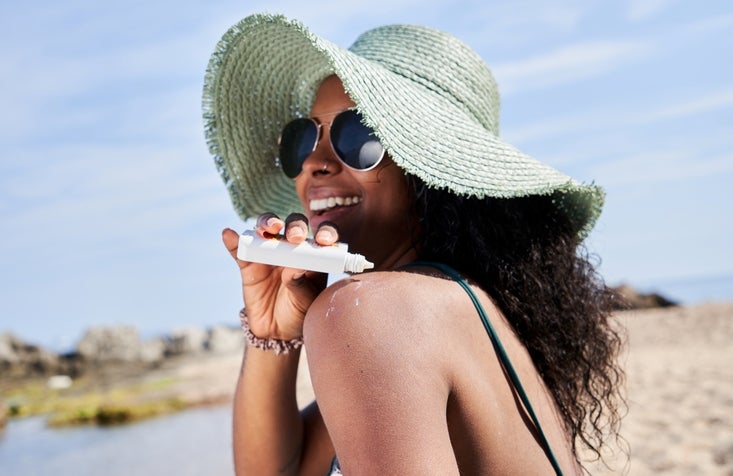The Truth About Sunscreen: What Your Skin Really Needs
May 21, 2025
Categories: Health & Wellness, Primary Care, Cancer, Ask a Doc
Tags: skin health, skin safety, skin checks, Dermatology, Melanoma, Skin Cancer
We all know the sun can be tough on our skin—but when it comes to protecting yourself, misinformation is everywhere. Whether it’s cloudy skies fooling you into skipping sunscreen or the belief that melanin is full armor, sun damage myths can lead to serious—and even dangerous—consequences for your skin.
Let’s break down some of the most common misconceptions and get to the truth about sun exposure, skin cancer risk, and how to truly protect your skin.

David Doud, DO
Internal Medicine, Primary Care
Trinity Health Medical Group, Academic Internal Medicine - Grand Rapids Campus
Accepting new patients
View DetailsDo You Need Sunscreen on Cloudy Days?
David Doud, DO: Up to 80% of UV rays can pass through clouds.
Even on overcast days, your skin is still exposed to harmful ultraviolet (UV) radiation. If you’re skipping sunscreen just because the sun’s not out, you’re still at risk of sunburn and long-term damage—including increased risk for skin cancer.
Pro tip: Make sunscreen part of your daily routine, just like brushing your teeth.
Do People with Darker Skin Need to Worry About Sun Protection?
David Doud, DO: Melanin offers some natural protection—but it’s not enough.
While it’s true that melanin helps filter UV rays, no one is immune to the harmful effects of sun exposure. Skin cancer can and does occur in people with darker skin tones—and unfortunately, it’s often diagnosed at a later stage, when it can be more difficult to treat.
A well-known example is musician Bob Marley, who developed a rare form of melanoma that was initially overlooked. His story is a powerful reminder that sun protection matters for everyone, regardless of skin tone.
Pro tip: Everyone should wear a broad-spectrum sunscreen with SPF 30 or higher as part of their daily routine.
Will A Base Tan Protect You from Burning?
David Doud, DO: A tan is actually a sign of skin damage.
There’s no such thing as a “safe tan.” When your skin changes color, it’s reacting to UV radiation—damage that can build over time and raise your risk for skin cancer.
Pro tip: Skip the tanning beds and bronzing shortcuts. Opt for sunless tanning products if you love the glow.
Is Sunscreen Only Necessary at the Beach or Pool?
David Doud, DO: UV rays are everywhere—even through your car windows.
You don’t have to be sunbathing to get too much sun. Walking the dog, gardening, or even commuting exposes your skin to UV rays.
Pro tip: Keep a travel-size sunscreen in your bag or car for on-the-go reapplication.
Does One Application in the Morning Protect You All Day?
David Doud, DO: Sunscreen wears off.
Sweating, swimming, and even time itself can reduce your sunscreen’s effectiveness. Reapplying every two hours—or immediately after water exposure—is essential to keeping your skin protected.
Pro tip: Set a timer or reminder on your phone so reapplication becomes second nature.
Will My Baseball Hat Protect My Head?
David Doud, DO: A hat is better than nothing, but a baseball cap only protects part of your head and face.
Hats with wide brims help shield your face, ears, and neck—common spots for skin cancer. UPF (ultraviolet protection factor) clothing, like long-sleeved shirts and sun-protective pants, can keep you cool and safe. These are great for yardwork, watching soccer games, beach days, or any time outdoors. Also seek shade when possible, and try to avoid sun exposure between 10 a.m. and 4 p.m.
Are All Sunscreens Created Equal?
David Doud, DO: No—there are different types, and it matters which one you choose.
The American Academy of Dermatology recommends broad-spectrum sunscreen with SPF 30 or higher to protect against both UVA and UVB rays. Mineral (physical) sunscreens are a good option for sensitive or acne-prone skin, and they’re safer for marine life—but they may leave a white tint. Chemical sunscreens, which absorb UV rays and convert them to heat, blend more easily into the skin but require a 15-minute wait to become effective.
Does Sun Exposure Age Your Skin?
David Doud, DO: Yes—sun damage is one of the top causes of premature aging.
UV exposure breaks down collagen and elastin, reduces skin elasticity, and contributes to free radical formation—all of which speed up wrinkles and sagging.
Pro tip: A daily moisturizer with SPF is a simple way to prevent sun-related aging and start your day protected.
“I have many patients who’ve had to undergo skin cancer removal and wish they could go back to their earlier years to be more consistent with sun protection. Let’s learn from their experiences and do what we can now,” said Dr. David Doud, internal medicine physician. “Skin cancer can look different on everyone. Warning signs include a mole that suddenly changes or enlarges, a spot that stands out or won’t heal, or one that itches, burns, or feels painful. If something doesn’t look or feel right—get it checked.”
Read: What Does Melanoma Really Look Like? Five Skin Changes You Shouldn't Ignore.
Make Sunscreen a Habit, Not a Hassle
Sun damage can creep in when you least expect it, and over time, those small exposures can add up to bigger health risks. But protecting your skin doesn’t have to be complicated. Busting these common myths is the first step to healthier, more protected skin all year long.



